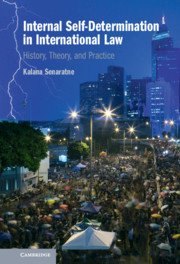Book contents
- Internal Self-Determination in International Law
- Internal Self-Determination in International Law
- Copyright page
- Dedication
- Contents
- Acknowledgements
- Table of Cases
- Abbreviations
- 1 Introduction
- 2 A History of Internal Self-determination
- 3 Internal Self-determination and the Populations of States
- 4 Internal Self-determination and Minority Groups
- 5 Western and Third World Approaches to Internal Self-determination
- 6 Sri Lanka
- 7 Hong Kong
- 8 Internal Self-determination in the Courts of Law
- 9 Conclusion
- Bibliography
- Index
5 - Western and Third World Approaches to Internal Self-determination
Published online by Cambridge University Press: 23 July 2021
- Internal Self-Determination in International Law
- Internal Self-Determination in International Law
- Copyright page
- Dedication
- Contents
- Acknowledgements
- Table of Cases
- Abbreviations
- 1 Introduction
- 2 A History of Internal Self-determination
- 3 Internal Self-determination and the Populations of States
- 4 Internal Self-determination and Minority Groups
- 5 Western and Third World Approaches to Internal Self-determination
- 6 Sri Lanka
- 7 Hong Kong
- 8 Internal Self-determination in the Courts of Law
- 9 Conclusion
- Bibliography
- Index
Summary
This chapter discusses Western and Third World approaches to internal self-determination. Traditionally, international lawyers argued that it is the West that supports internal self-determination, while the Third World supports external self-determination. This chapter argues that that claim is not valid anymore. There are many similarities in how states and institutions of the West and the Third World appreciate and understand internal self-determination. The chapter develops, however, a Third World critique of internal self-determination that questions the content of the principle as well as the purposes for which internal self-determination is promoted by the West. Concerns arising from this critique apply not only to Third World states but also to small and weak states, both in the West and the Third World generally.
Keywords
- Type
- Chapter
- Information
- Internal Self-Determination in International LawHistory, Theory, and Practice, pp. 118 - 154Publisher: Cambridge University PressPrint publication year: 2021



